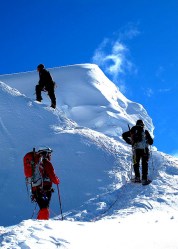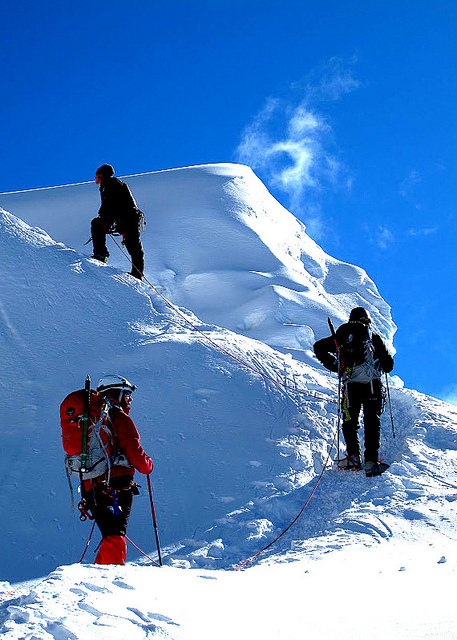A version of this article originally appeared on Climate Progress.

Climate change is already keeping climbers off Everest. (Photo by Mandala Travel.)
Mount Everest has become a microcosm for the rest of the planet. Once an isolated place for adventurers, the mountain is now extremely crowded, polluted, and facing dramatic changes as global temperatures rise.
As commercial climbing outfits have blossomed over the last two decades, more and more climbers are flocking to Everest. The overcrowding problem became clear earlier this month when the mountain was clogged by a traffic jam of roughly 150 people trying to reach the summit — contributing to the death of four climbers.
The traffic jam made big news. But a couple weeks before the incident, another major event took place on the mountain that only got attention from within the climbing community.
Russell Brice, head of the leading Everest climbing operation Himalayan Experience, announced that he would pull his team off Everest, citing unprecedented temperatures that made climbing too dangerous. Heeding advice from experienced Sherpas worried about the warmth, Brice decided to cancel his 2012 expedition because of unstable ice.
In a blog post, Brice’s crew explained the decision:
- Already at the beginning of the season, the Sherpas were saying that it was too warm when they were setting up base camp. They were working in T-shirts.
- Our Sherpas continuously reported that the icefall is more dangerous and the “popcorn area” is more active this year. They were not worried about taking the risk but they were very aware of the increased hazards.
- In 2011, this risk of the looming seracs on the West Ridge was more acceptable as the debris fell into the Bergschrund, a deep crevasse between the glacier and the mountain. Then we were about 100 meters [328 feet] away from where debris was falling, however, this year the Bergschrund is filled and there is no protection at all. The route has dropped off and now we are only 25 meters to 30 meters [82 feet to 98 feet] away from debris, which is constantly covering the route.
- When we first arrived at base camp at the beginning of April, the crack in the ice block on the West Ridge was pretty small — now it is probably between 5 and 7 meters [16 feet and 23 feet] wide. This means that the pressure within the ice blocks is huge. So far, we only had small pieces come down, however, there is certainly the potential for a huge collapse, which could kill and injure a large number of people.
- We have been recording the temperature at 2 a.m. when the Sherpas are usually leaving to go through the icefall. There have only been a few days when it was colder than -10 degrees C [14 degrees F], which is unusual and not really cold enough to be moving through the icefall.
- Now, it is only the beginning of May and lakes are forming at base camp. Today, on May 8, it is as warm as it is normally at the end of the season and it will only get warmer, which means the danger in the icefall will increase.
This is not the first warning sign for climbers on Everest. Apa Sherpa, a Nepali “super Sherpa” who has been up Everest more than 20 times, has expressed deep concern for the changes he’s seen on Everest over the last two decades.
“In 1989, when I first climbed Everest, there was a lot of snow and ice, but now most of it has just become bare rock. That, as a result, is causing more rockfalls which is a danger to the climbers,” he recently told AFP News in an interview.
In 2011, the International Center for Integrated Mountain Development issued an assessment of glaciers in the Himalayas, finding that glaciers in the region have declined by 21 percent over the last 30 years.
Increasingly unstable ice and rock are making Everest ascents more dangerous. Greg Paul, a climber with Himalayan Experience, explained the decision to abandon the mountain this year: “Russell [Brice] expects an accident of catastrophic proportions to possibly [sic] hit the icefall.”



